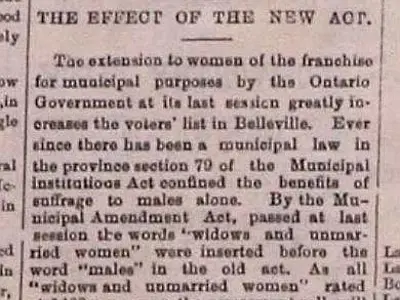Widows and Old Maids

Voting in municipal elections had been an entirely male affair until the election of 1884, when women were granted the vote for the first time. The franchise was still quite limited: it was only available to widows and unmarried women who owned property worth over $400.
On 1 December 1884, the Daily Ontario newspaper published a list of the names of all the Belleville women who would meet these requirements. The headline was "Widows and Old Maids." In all, 223 women would be added to the voters' list as a result of the change. The city's population at the time was around 9,500, meaning that the new law would grant the vote to just 1 in 20 of the female inhabitants.
The woman with the largest number of city lots at this time was Caroline Wallbridge, who lived from 1825 to 1891. In the 1877 Evans and Bolger map shown here, we have marked the lots owned by Caroline in Coleman and Murney Wards in the northwest part of the city. They were formerly part of the Wallbridge family's estate which was subdivided in 1872. The total value of her Belleville property was in the region of $5,000 in 1884.
In the newspaper's words, this land was more than enough for this particular "old maid" to be able to "vote like a man" in the January 1885 municipal election. It would be another 32 years before any women would be permitted a similar role in Ontario's provincial politics, and 33 years before they could have a say in the results of a federal election.
Contact Us
Community Archives
254 Pinnacle Street
Belleville, Ontario
K8N 3B1
phone: 613-967-3304
email: archives@cabhc.ca
